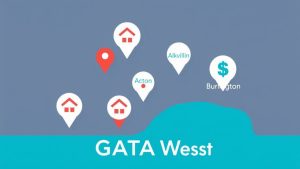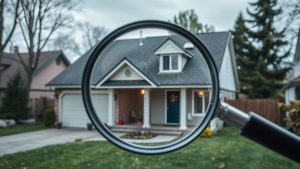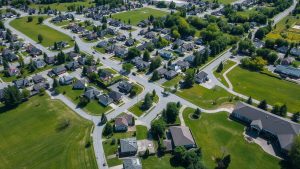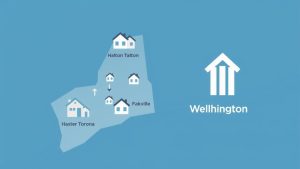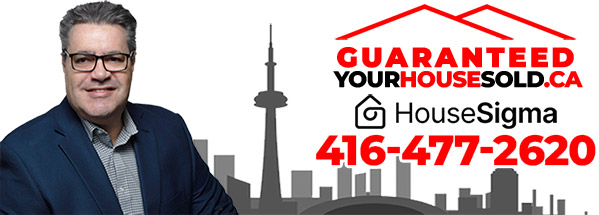Are you worried about making a big mistake buying or selling your home in the crazy GTA market?
This is your simple how-to guide. It helps people buying or selling homes. Especially in places like Georgetown, Milton, Guelph, Acton, Oakville, and Burlington. We will show you how to handle the market today. We will cover understanding the market, getting money ready, finding a home or buyer, legal stuff, and moving tips. Use this guide to feel sure about your choices.
Understanding the Wild GTA Market (What You MUST Know for 2024/2025)
The Greater Toronto Area real estate market is always changing. It can feel confusing. Knowing what is happening helps you make smart choices. Whether you buy or sell, understanding the market is step one.
What’s Happening Right Now? (GTA Market Snapshot)
- Interest Rates: Rates went up. Now they are starting to stabilize, maybe even come down a bit later in 2024 or 2025. This affects how much house you can afford. Higher rates mean higher monthly payments. Lower rates mean payments might go down.
- Prices: Prices cooled off from the peak crazy times. But the GTA is still expensive. Some areas are hotter than others. Places like Milton and Guelph see lots of interest. Oakville and Burlington remain pricey. Georgetown and Acton offer a different feel but prices are catching up.
- Inventory: More homes are for sale now than a year or two ago. This gives buyers more choice. Sellers have more competition. But good homes, priced right, still sell fast.
- Buyer Demand: Lots of people still want to buy homes here. First-time buyers are looking. People moving to the area need places. This keeps the market active.
Focus on Your Town: Georgetown, Milton, Guelph, Acton, Oakville, Burlington
Each town has its own vibe and market facts.
- Georgetown & Acton: These towns feel smaller. They have charm. Prices are usually lower than Oakville or Milton. But they are growing. Good for families looking for community. Expect decent competition for updated homes in good spots. Trends show steady price growth here as people seek affordability outside the core GTA.
- Milton: Growing fast! Lots of families move here. Good schools, parks, close to highways. The market is very active. Bidding wars can still happen for popular homes. New construction is common. 2024 data shows Milton remains a top choice for young families, keeping demand high.
- Guelph: University town with a strong job market (especially tech). It has a unique feel. Prices are strong. Lots of interest from buyers wanting a city feel without being Toronto. Expect a competitive market, especially near the university or downtown. 2025 forecasts suggest Guelph‘s diverse economy will keep its housing market stable.
- Oakville & Burlington: Often the most expensive towns in this group. Close to the lake, great schools, easy commute for some. Homes here hold value well. You need a bigger budget. The market is active, but maybe slightly slower than peak times. High-end homes see steady demand. Look for stable prices with moderate growth predicted into 2025.
What is a Buyer’s Market vs. Seller’s Market?
- Seller’s Market: Lots of buyers, not many homes for sale. Prices go up. Bidding wars happen. Sellers have more power. This was common in the GTA recently.
- Buyer’s Market: Lots of homes for sale, fewer buyers. Prices might drop. Buyers have more power to negotiate. This is less common in the GTA but can happen in certain areas or price points.
- Balanced Market: Supply and demand are roughly equal. Prices are stable. Negotiations are more even. Parts of the GTA might feel like this now, depending on the specific town and house type.
Knowing the market type helps you plan. As a buyer, you know if you need to act fast. As a seller, you know how to price your home.
Expert Insight: “Right now, the GTA market requires strategy,” says Sarah Chen, a Burlington real estate agent. “Buyers have slightly more breathing room than two years ago, but sellers with well-presented, fairly priced homes are still seeing strong interest, especially in high-demand areas like Milton and Oakville. Preparation is key for both sides.”
Getting Your Money Right: Financing Your GTA Home
Buying a home costs money. A lot of money. Getting your finances sorted early is super important. It avoids stress later.
Step 1: Figure Out What You Can REALLY Afford
Don’t just guess. Look at your income. Look at your debts (credit cards, car loans, student loans). Use online calculators, but be careful. They don’t know your spending habits.
Think about:
- Monthly mortgage payment (principal and interest)
- Property taxes (these vary a lot by town – Guelph might be different than Oakville)
- Home insurance
- Utilities (heat, hydro, water)
- Maintenance (save 1% of home value per year is a rough guide)
- Condo fees (if buying a condo)
Add all this up. Can you still live? Can you save money? Can you handle surprises (like a broken furnace)? Be honest with yourself.
Step 2: Save for Your Down Payment
In Canada, the minimum down payment depends on the home price:
- Price $500,000 or less: 5% down
- Price $500,001 to $1 million: 5% on the first $500,000, plus 10% on the part above $500,000.
- Price over $1 million: 20% down
Many homes in the GTA, especially Oakville and Burlington, cost over $1 million. You will need a large down payment (20%).
Saving takes time. Be patient. Cut costs where you can. Make a savings plan.
Step 3: Get Mortgage Pre-Approval (This is HUGE!)
This is maybe the most important step before you look at houses. A mortgage pre-approval means a lender looked at your finances. They tell you how much they might lend you. They give you an interest rate hold (usually for 90-120 days).
Why is pre-approval vital?
- Know your budget: It gives you a real price range.
- Shows you are serious: Sellers prefer offers from pre-approved buyers.
- Acts fast: In a busy market (like Milton or Guelph), you can make an offer quickly.
- Protects you: You know you can likely get the money.
Talk to a mortgage broker or your bank. They help you through the process. Provide documents like pay stubs, bank statements, tax info.
Financial Planning: Don’t Forget Closing Costs
Your down payment is not the only upfront cost. Closing costs add up. Budget for these too! They can be 1.5% to 4% of the home’s price.
What are closing costs?
- Land Transfer Tax: Ontario has one. Toronto has its own too (but not applicable for Georgetown, Milton, Guelph, Acton, Oakville, Burlington unless you buy in Toronto city limits). This is often the biggest closing cost. First-time buyers might get a rebate.
- Legal Fees: You need a lawyer to handle the paperwork.
- Title Insurance: Protects you and the lender from title issues.
- Home Inspection: Smart to get one. Costs a few hundred dollars.
- Appraisal Fee: Sometimes the lender requires this.
- Adjustments: Paying the seller back for prepaid property taxes or utilities.
- Mortgage Insurance (CMHC Insurance): Needed if your down payment is less than 20%. The cost is added to your mortgage.
Ask your lawyer or mortgage broker for an estimate of closing costs in your target town (e.g., Acton vs. Oakville costs differ due to price).
First-Time Home Buyer Programs Ontario
Are you a first-time buyer? Look for help!
- Land Transfer Tax Rebate: You might get back up to $4,000 from the Ontario land transfer tax.
- First Home Savings Account (FHSA): A new federal account. Combines features of RRSP and TFSA for saving for a down payment. Contributions are tax-deductible. Withdrawals (including investment income) to buy a first home are tax-free.
- Home Buyers’ Plan (HBP): Allows you to borrow from your RRSPs (up to $60,000 per person as of 2024) tax-free for a down payment. You have to pay it back over 15 years.
Check government websites (Canada Revenue Agency, Ontario Ministry of Finance) for details. Rules can change.
Secret #1: Buy Lower Than Your Max Budget
The article mentioned buying at the lower end of what you can afford. This is smart advice. If you are approved for $900,000, maybe look at homes around $800,000 – $850,000. Why?
- Less Stress: Lower payments mean more breathing room in your budget.
- Room for Upgrades: You have money left for repairs or making the house your own.
- Investment Potential: Sometimes, a slightly smaller home in a great area (like a good part of Milton or Guelph) grows in value faster than a huge home.
- Handles Rate Changes: If interest rates go up later, your lower mortgage is easier to manage.
Don’t stretch yourself thin just because the bank says you can borrow a huge amount. Live comfortably.
Finding Your Dream Home: The Buyer’s Journey in the GTA
You have your pre-approval. You know your budget. Now the fun part starts: house hunting! But it’s also work.
Step 1: Define What You Need (and Want)
Be realistic. Make a list.
- Needs (Must-haves): Number of bedrooms/bathrooms, location (commute time to work in Oakville?), specific school district in Milton? Garage? Main floor living?
- Wants (Nice-to-haves): Big backyard, finished basement, new kitchen, pool?
Separate needs from wants. You might need to compromise, especially in expensive areas like Burlington.
Step 2: Choose Your Location Wisely
Location is everything in real estate. Think long-term.
- Commute: How long to work? To family? Check traffic patterns during rush hour.
- Schools: Even if you don’t have kids, good schools help resale value. The article stressed this. Check Fraser Institute rankings or EQAO scores for schools in Guelph, Georgetown, etc. A home in a top school zone often sells faster and for more money.
- Amenities: Close to groceries, parks, doctors, community centres? What’s important to your lifestyle?
- Neighbourhood Vibe: Do you want quiet streets (maybe Acton)? Or something lively (closer to downtown Guelph)? Visit at different times of day.
- Future Growth: Are there plans for new transit, shops, or parks? This can increase value later.
Secret #2: School Districts Matter (Even Without Kids)
As the original article said, school quality impacts home value. Buyers with kids pay close attention. They often search by school catchment area. Buying in a good school zone in Milton or Oakville protects your investment. If schools aren’t key for you personally, you might find a slightly cheaper house in a lower-ranked school zone. But think about resale later.
Secret #3: Look for Good Bones in Great Neighbourhoods
The old saying “buy the worst house on the best street” still holds true. If you can find a smaller home, or one needing cosmetic updates, in a top neighbourhood (like certain parts of Burlington or established areas of Guelph), do it!
Why?
- Location Value: The land and address are worth a lot.
- Sweat Equity: You can fix it up over time and add value.
- Appreciation: Your home’s value gets pulled up by the nicer homes around it.
How to spot a ‘good neighbourhood’?
- Clear Boundaries: Defined areas (by roads, parks) often have stronger identity.
- Well-Kept Homes: Pride of ownership is visible.
- Good Reputation: People know the area and speak well of it.
- Signs of Investment: New shops, cafes, renovations happening.
Step 4: Finding a Real Estate Agent in Guelph (or Milton, or Oakville…)
A good local agent is your guide. They know the market (prices, trends in Georgetown vs. Acton). They have access to listings (MLS). They help with paperwork and negotiations.
How to choose?
- Get Referrals: Ask friends or family.
- Interview Agents: Talk to 2-3 agents. Ask about their experience in your target town (e.g., Guelph real estate agent).
- Check Experience: How long have they worked in the area? Do they work with buyers like you (first-time buyers Mississauga guidance)?
- Communication: Do they listen? Do they explain things clearly? Are they responsive?
- Don’t Choose Based on Commission Alone: Value matters more than just the lowest fee.
Your agent works for you. Be honest with them about your needs and budget.
Step 5: The House Hunt
- Online Search: Use realtor.ca (public MLS access) and agent websites. Save searches.
- Open Houses: A good way to see different homes and neighbourhoods quickly.
- Private Showings: Your agent schedules these for homes you really like.
- Be Prepared to Act: Good homes sell fast. Especially entry-level homes Mississauga or popular family homes in Milton. Have your pre-approval ready.
- Take Notes: Homes blend together after seeing many. Note pros and cons.
Step 6: Making an Offer
You found “the one”! Your agent helps you write an Offer to Purchase. Key parts:
- Price: What you offer to pay.
- Deposit: Shows you are serious (usually 5% of price, paid within 24 hours of acceptance).
- Conditions: Things that must happen for the deal to be firm. Common ones:
- Financing condition (you need final mortgage approval)
- Home inspection condition (you want a satisfactory inspection)
- Sale of buyer’s property condition (if you need to sell your current home first – harder to get accepted in a seller’s market)
- Closing Date: The day you officially take ownership.
- Inclusions/Exclusions: What stays (appliances?) and what goes (seller’s chandelier?).
Your agent advises on strategy. How much to offer? What conditions are safe to include or waive (be careful waiving conditions!)?
Secret #4: Be Flexible on Closing Dates
This can be a secret weapon! If you can match the seller’s preferred closing date, your offer might look better than others. Even if your price is slightly lower. Some sellers need a fast close. Others need a long close. Ask your agent to find out the seller’s preference. Flexibility gives you an edge.

Selling Your House Fast Burlington (or Milton, Guelph…) – The Seller’s Side
Selling your home needs planning too. You want the best price and a smooth sale.
Step 1: Decide WHEN to Sell
- Spring Market (April-June): Usually the busiest. Lots of buyers looking. More competition from other sellers.
- Fall Market (Sept-Oct): Second busiest season. Buyers are serious before winter.
- Summer/Winter: Often slower. Less competition, but maybe fewer buyers.
Look at current GTA market trends (2024/2025). Is inventory high or low in your town (e.g., Acton vs. Georgetown)? Talk to your agent.
Step 2: Choose a Listing Agent
Similar to finding a buyer’s agent. Look for local expertise (e.g., someone specializing in selling homes in Milton). Ask about their marketing plan. How will they promote your home? What is their commission structure?
Step 3: Price it RIGHT
Pricing is critical. Too high? Buyers ignore it. Too low? You leave money on the table.
Your agent does a Comparative Market Analysis (CMA). They compare your home to similar homes recently sold in your neighbourhood (e.g., recent sales in Oakville near you).
Be realistic. The market decides the price, not just what you want or need. Pricing right from the start gets more interest and often a better final price.
Step 4: Prepare Your Home for Sale (Declutter, Clean, Stage)
First impressions matter HUGE. Buyers decide quickly.
- Declutter: Remove personal items, extra furniture. Make rooms look bigger.
- Deep Clean: Floors, windows, bathrooms, kitchen. Make it sparkle.
- Repairs: Fix leaky faucets, broken tiles, scuffed paint. Small fixes make a big difference.
- Curb Appeal: Tidy the yard, paint the front door, add flowers. Make people want to come inside.
- Staging (Optional but Recommended): Can involve rearranging furniture or renting items. Helps buyers imagine living there. Ask your agent if they offer staging help.
Step 5: Marketing Your Home
Your agent handles this, but understand the plan:
- Photos/Video: Professional photos are essential. Video tours are great too.
- MLS Listing: This gets your home seen by all agents and buyers.
- Online Promotion: Realtor.ca, agent website, social media.
- Signage: The classic lawn sign.
- Open Houses/Showings: Be flexible allowing buyers to see the home.
Step 6: Receiving and Negotiating Offers
Your agent presents all offers. You review:
- Price: The amount offered.
- Deposit: Higher deposit can mean a stronger buyer.
- Conditions: Fewer conditions are better for the seller. No conditions (a “firm offer”) is best, but buyers may offer less money for that certainty.
- Closing Date: Does it work for you? (Remember Secret #4 about flexibility? It works both ways!)
You can accept an offer, reject it, or make a counter-offer. Your agent guides negotiations.
What if You Get Multiple Offers?
This happens in hot markets (like parts of Milton or Guelph sometimes). Your agent helps manage this. You might set a deadline for offers. You review them all. You choose the best offer overall (not always the highest price – conditions and closing date matter too).
The Deal is Done (Almost!): Legal and Closing Steps
You have an accepted offer! Congrats! But it’s not over yet.
Role of the Real Estate Lawyer
You need a lawyer (or notary in some places, but usually a lawyer in Ontario) for the closing. They handle the legal stuff.
- Buyer’s Lawyer: Checks the title (ownership history), registers the mortgage, arranges title insurance, confirms property taxes are paid, handles transfer of funds.
- Seller’s Lawyer: Prepares the deed transfer documents, receives funds from buyer’s lawyer, pays off seller’s mortgage, pays real estate commissions, gives remaining funds to seller.
Choose your lawyer early. Ask for quotes. Ensure they specialize in real estate.
What Happens Between Offer Acceptance and Closing?
- Conditions Met: If the offer had conditions (financing, inspection), the buyer works to satisfy them by the deadline. If met, the deal becomes “firm”.
- Deposit: Buyer pays the deposit (usually to the listing brokerage, held in trust).
Secret #5: Pay Your Deposit with Certified Funds
Good tip from the article. Use a bank draft or certified cheque for your deposit. If your offer isn’t accepted (or the deal falls through on conditions), getting your money back from a certified payment is much faster (1-3 days usually). A personal cheque can take weeks to clear and be returned, tying up your funds when you need them to offer on another house.
- Mortgage Finalized: Buyer works with lender to get final mortgage approval.
- Home Insurance: Buyer arranges home insurance to start on closing day.
- Lawyer Work: Both lawyers do their searches and prepare documents.
- Utilities: Buyer and seller arrange to transfer utilities (hydro, gas, water) for the closing date.
- Final Walk-Through: Buyer usually visits the property one last time just before closing to ensure it’s in the agreed condition.
Closing Day
This is the day ownership transfers. You usually don’t meet the other party. Lawyers handle the money and keys.
- Buyer signs final papers with their lawyer, gives remaining down payment + closing costs.
- Lawyers exchange documents and funds electronically.
- Deed is registered in buyer’s name.
- Seller’s lawyer confirms funds received.
- Keys are released to the buyer (often picked up from the lawyer or a lockbox).
Welcome home (or congratulations on your sale)!
Moving Day: Tips for a Smoother Transition
Moving is stressful. Plan ahead.
- Book Movers Early: Especially if moving during peak season (summer). Get quotes from several companies.
- Declutter AGAIN: Don’t pay to move stuff you don’t need.
- Change Your Address: Canada Post, bank, driver’s license, health card, subscriptions.
- Pack Smart: Label boxes clearly (room and contents). Pack an “essentials” box for the first night (toiletries, meds, chargers, basic tools, snacks).
- Notify Utilities: Confirm shut-off at old place, start-up at new place.
- Clean: Leave your old place clean. Clean the new place before unpacking (if possible).
Common Beginner Mistakes (and How to Avoid Them)
Buying or selling a home is complex. Avoid these common errors:
- Not Getting Pre-Approved: You waste time looking at homes you can’t afford.
- Ignoring Closing Costs: Budget surprise! Plan for 1.5-4% of purchase price.
- Making Emotional Decisions: Falling in love with decor, ignoring big issues (bad roof, poor location).
- Skipping the Home Inspection: Big risk! Inspections find hidden problems.
- Not Researching the Neighbourhood: Visit at different times. Check commute, schools, safety.
- Using the Wrong Agent (or No Agent): A good local agent is worth it.
- Being Inflexible: Unwillingness to negotiate (on price or closing date) can kill a deal.
- (Seller) Pricing Too High: Your home sits unsold and gets stale.
- (Seller) Poor Home Presentation: Clutter and dirt turn buyers off.
Being aware of these helps you avoid them. Use this guide, ask questions, work with professionals.
Expert Insight: “The biggest hurdle i see, especially for first-time buyers in competitive markets like Guelph, is analysis paralysis combined with rushing,” notes Mark Davies, a Guelph mortgage broker. “Get pre-approved early so you know your numbers. Then, take time to find the right house, not just any house. But be ready to act decisively with your agent when that right one appears. Preparation builds confidence.”

Frequently Asked Questions (FAQ) for GTA Home Buyers & Sellers
Q: How much down payment do i really need in Ontario?
A: Minimum is 5% for homes up to $500k. It’s 5% on the first $500k + 10% on the portion up to $1M. Over $1M, you need 20% down. Many homes in Oakville, Burlington easily exceed $1M, requiring that 20% minimum.
Q: What are typical closing costs in Guelph or Milton?
A: Budget 1.5% to 4% of the purchase price. The biggest cost is usually Ontario Land Transfer Tax. A $800,000 home might have $25,000 – $30,000+ in closing costs (including tax, legal, title insurance etc.). First-time buyers may get a land transfer tax rebate.
Q: Is now (2024) a good time to buy in the GTA?
A: It depends on your situation. Prices are high but stable compared to peaks. Inventory is better. Rates are a factor. If your finances are solid and you plan to own long-term (5+ years), it can be a good time. Trying to ‘time the market’ perfectly is very hard.
Q: How long does it take to sell a house in Burlington or Georgetown?
A: It varies. Average ‘Days on Market’ (DOM) changes. In late 2024, well-priced homes in desirable areas might sell in 15-30 days. Some sell faster, some take longer. Market conditions, price, and home condition are key factors.
Q: Do i need a 20% down payment to avoid CMHC insurance?
A: Yes. If your down payment is less than 20%, you must pay for mortgage default insurance (often called CMHC insurance, though other companies offer it too). The premium is usually added to your mortgage amount.
Q: Where can i find reliable GTA real estate stats?
A: Local real estate board websites are good sources (e.g., Toronto Regional Real Estate Board – TRREB covers much of the GTA). News reports often cite their data. Your real estate agent also has access to current market statistics.
[Link to Toronto Regional Real Estate Board Market Watch]
[Link to Real Estate Council of Ontario (RECO) – Consumer Info]
Buying or selling a home in Georgetown, Milton, Guelph, Acton, Oakville, or Burlington is a big step. It takes planning. Use the tips in this guide. Get your money sorted first. Work with good local professionals (agent, lawyer, broker). Understand the current market. Prepare your home well if selling. Be ready to act but don’t rush into bad decisions. You can navigate this market successfully. Take the next step with confidence. Share this guide if it helped you.



